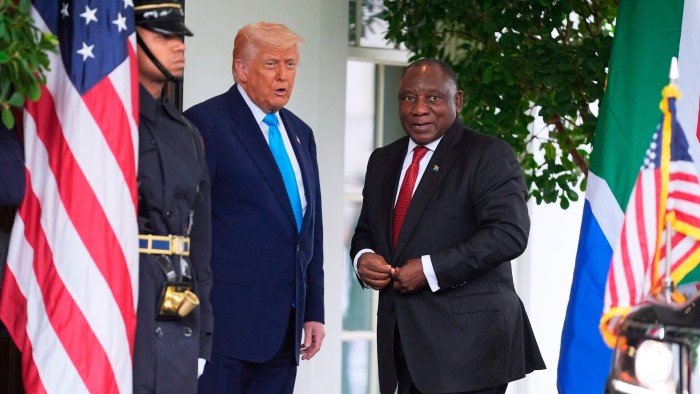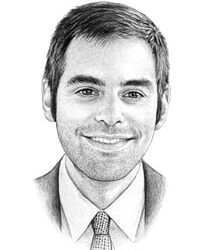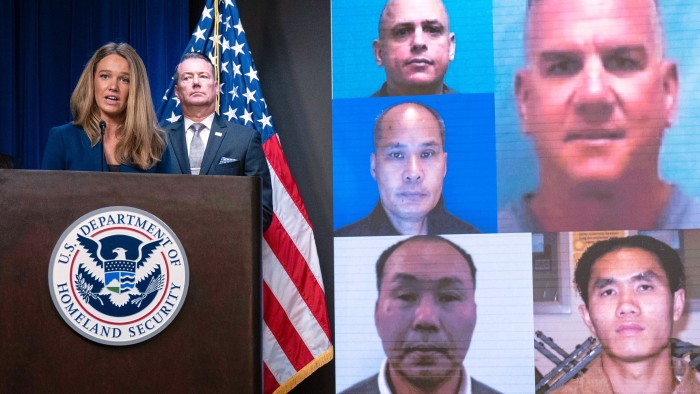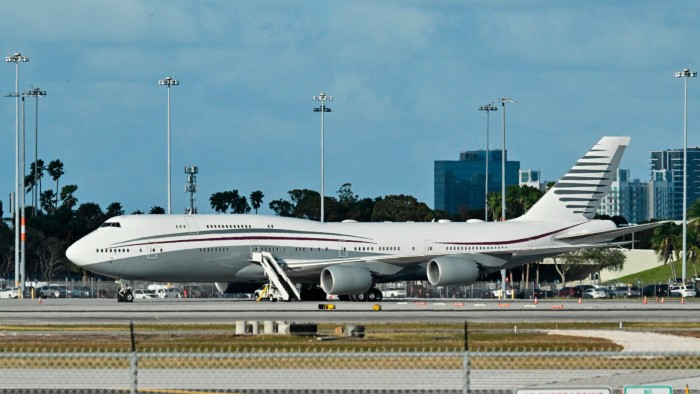Listen to Afrikaners, not Trump, on the state of South Africa

Unlock the White House Watch newsletter for free
Your guide to what Trump’s second term means for Washington, business and the world
If Donald Trump performs another of his spectacular U-turns and agrees to attend the G20 summit in South Africa in November, his host, President Cyril Ramaphosa, should promptly insist on entertaining him in Cape Town.
It is not just that the Cape has stunning golf courses to delight the US president and that it is one of the world’s most alluring destinations in the southern hemisphere’s spring. There, Ramaphosa can also give Trump a subtle lesson in the true mindset of the white Afrikaner minority, and without having to risk his wrath by formally rebutting the US president’s lurid claims — repeated by him in the White House on Wednesday — that Afrikaner farmers face a “genocide”.
All Ramaphosa has to do is take Trump for a stroll past the giant statue of Louis Botha, which overlooks the national parliament, and give a potted history of the doughty Boer “commando” leader turned South Africa’s first prime minister. The fact that he sits on his horse yards from where the multiracial parliament debates the country’s laws reflects how the post-apartheid state, for all its mis-steps, has not erased Afrikaner history — still less overseen a genocide.
Botha is arguably the ultimate symbol of how most Afrikaners have responded to the post-apartheid era after the election of the African National Congress in 1994 ended 46 years of Afrikaner rule — by adapting. On the statue’s plinth are the words: farmer, warrior, statesman. Botha embodies the many early 20th-century Afrikaners who opted to make peace with the then imperialist foe, the British empire, rather than fight on as bittereinders, as the irreconcilables were known.
The same phlegmatic spirit has broadly infused most Afrikaners in the last three decades as they have had to settle into life as a minority after dominating the apartheid bureaucracy and state. It has not been straightforward.
Scores of white farmers have been killed in recent years, often in brutal fashion. But this is criminality, not a concerted plan as the word “genocide” implies. South Africa’s shockingly high rate of crime affects all races. It is not just Afrikaners who are falling back on private security firms but any South Africans who can afford it. The shortcomings of the police are just one reflection of the hollowing out of the state under the ANC, a key factor in its loss of a majority in the elections last year.
Afrikaners absolutely have legitimate concerns, as one thoughtful farmer reminded me last weekend in the Free State, the old bastion of rural Afrikanerdom in the heart of the country. Like minorities around the world, they fret about the future of their language, and worry that their children may one day no longer be taught in Afrikaans.
Many are understandably alarmed by the inflammatory language they endure from populists. The old anti-apartheid chant, “Kill the Boer, kill the farmer”, revived by the radical Economic Freedom Fighters party, was ruled as hate speech by the courts in 2010 but this was subsequently overturned. The ANC has been too casual about this.
Afrikaners also fear the implications of the new land law which ultimately allows, as a last resort, for land to be expropriated for public use without compensation. The ANC counters that not a single farm has been expropriated but the fact that the bulk of farming land is owned by the white minority could spark future trouble.
Afrikaners also cite the impact of affirmative action programmes on their children’s job prospects. The wheel has indeed turned as the ANC seeks to redress the injustices of the past: under apartheid, Afrikaners were the beneficiaries of their own affirmative action scheme. But this has compelled many of them to be more entrepreneurial today.
Johann Rupert, the billionaire founder of Richemont, the luxury group, who helped set up the White House meeting between Ramaphosa and Trump, and Koos Bekker, the media magnate, are merely the most prominent of the many Afrikaner businessmen to thrive in the new order.
The 59 Afrikaners who have left South Africa for America as part of the controversial Trump administration refugee scheme may feel they have no prospects in South Africa. But these are not embarking on a new Great Trek. Rather they are modern-day bittereinders — or maybe just chancers who have cannily seized on an opportunity for a US green card. The Freedom Front Plus, the party of conservative Afrikaners, is after all in the government of national unity.
The hope for the many Afrikaners who see South Africa as their home, and indeed for all South Africans, has to be that the fractious White House meeting does two things: it ends once and for all the “white genocide” slur; and reminds Ramaphosa of the need to up his game.








